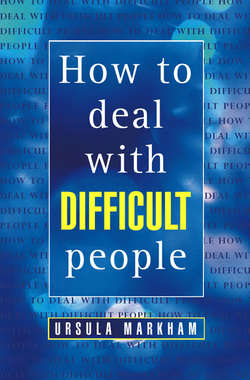Читать книгу How to Deal With Difficult People - Ursula Markham, Ursula Markham - Страница 37
Dealing with Criticism
ОглавлениеNo one really likes to be criticized. An assertive person, however, will realize that criticism falls into two categories:
Unfair: If criticism is unfair, it is unimportant and you should not pay any attention to it.
Fair and constructive: If the criticism is justified, although you still may not like to hear it, in the long term it can prove to be useful and positive.
Reacting aggressively to criticism causes problems of its own. If you snap back at the critic you will probably start an argument. If you are not assertive, you will not win the argument and you will end up feeling bad about it.
If you react submissively to criticism and always agree with the critic, whether or not he is being fair and just, you are simply pushing yourself lower and lower in his estimation – and in your own. Eventually you will reach the stage where you never do anything at all in case it attracts criticism from others. There are three main techniques for dealing with criticism:
If the criticism is fair – agree with whatever is justified (although not with that which is simply judgemental) and say what you intend to do about it:‘It was your turn to do the washing-up this morning and it’s still there in the sink [criticism]; you’re absolutely hopeless [judgement]’.‘Yes, it was my turn. I’ll do it right now.’This is not a submissive response because the criticism is a fair one. You did promise to do the washing up and you failed to do so. Your reply will serve to show the critic that you acknowledge the fault and intend to put things right. This will take the wind out of his sails and a possible argument will be avoided.
If the criticism has an underlying truth but is exaggerated – accept that which is justified but do not react in any way to the exaggeration:‘You were supposed to have that report on my desk by 9 this morning and you still haven’t finished it. You just don’t care. Everyone else always ends up doing your work.’ (The only true part of this criticism is likely to be the first sentence.)‘Yes, I am late submitting the report and I’m sorry about that. I’ll work through my coffee break and get it to you at the first possible moment.’By staying calm and responding only to the true part of the criticism, you remain in control of the situation. The critic will be appeased by your offer to go out of your way to put the matter right and, because you have not risen to the bait and responded aggressively to the unjust part of the criticism, an argument is less likely to ensue.
Responding with a question – this is a particularly useful response when someone is making a criticism of you personally as opposed to your work.‘You wouldn’t understand.’‘Why do you think I wouldn’t understand?’The critic’s reply to your question will help you to decide whether he is genuinely concerned about you – in which case he will go on to explain his comment – or is simply being unpleasant – in which case he is likely to begin to bluster, having nothing specific with which to back up his statement. Then you will know that he is not really worth bothering about and his remarks will cease to distress you.
